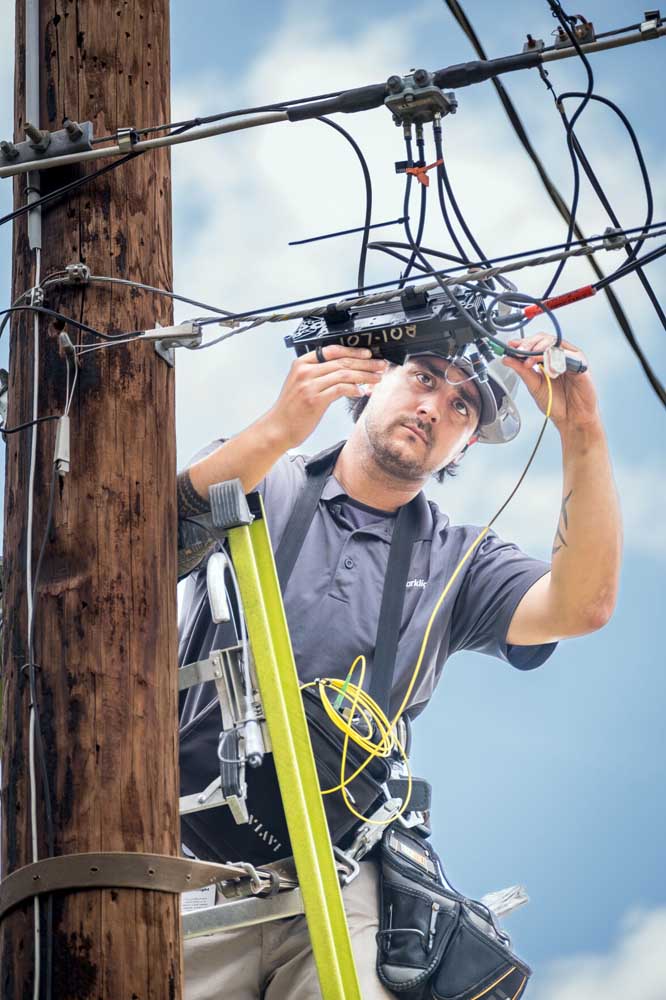East Texas Council of Governments moves forward with broadband expansion work
Published 5:40 am Sunday, September 29, 2024

- Fiber technician Jesse Clendenen with Sparklight installs a fiber optic internet connection to a home Wednesday, May 4, 2022, in Longview. (Les Hassell/Longview News-Journal File Photo)
East Texas Council of Governments leaders are moving ahead with a multi-year plan to expand broadband internet access throughout the region.
ETCOG leaders this past week held a town hall-style online meeting to give an update on progress the council has made in planning broadband infrastructure expansion and securing funds for that work.
The agency’s leaders are seeking almost $168.5 million in funding to install new fiber-optic internet infrastructure in counties throughout the region, part of a nationwide effort to ensure more Americans have access to online healthcare, banking, shopping, education and more.
Sixty-five broadband internet expansion projects are planned, spanning 13 of ETCOG’s 14 counties. Upshur County leaders did not participate because the county already is served by ETEX, an internet services provider. Project planning began in 2021 and wrapped up in May, when the final plan was approved.
ETCOG took a “grassroots approach” to broadband planning, said David Scott, the council’s director of special projects. Leaders there talked with local government officials about the needs each county had in terms of internet accessibility.
Scott said the time has come for ETCOG officials to move past the planning phase and “really start connecting people.”
To that end, Rebecca Gage, ETCOG’s economic development grant specialist, said the agency is looking primarily at three sources of funding to build new fiber-optic internet infrastructure in the region:
$3.3 billion in federal funding provided by the 2021 Infrastructure Investment and Jobs Act, better known as the bipartisan infrastructure bill. The Texas Broadband Development Office is overseeing that funding.
$1.5 billion in the Texas Broadband Infrastructure Fund, which Texas voters created by passing Proposition 8 in November 2023. That funding can be used to help meet grant cost-share requirements, also known as matching requirements, to secure federal funding.
The National Telecommunications and Information Administration, which Gage said has awarded “a lot of grants.”
The state’s Broadband Development Office has awarded funds to some Texas counties through its Bringing Online Opportunities to Texas (BOOT) Program. In the second round of funding this year, Marion County was selected as a recipient, Gage said.
ETCOG is working with grant writers who can help secure funding. Each county’s projects and funding needs are different, Scott said, and each grant application will be different as a result.
The council also is working with the city of Lakeport to help it get broadband access, Scott said. The council assessed the town’s needs and has received three bids from contractors. The next step is securing funding “to help get their broadband operations up and running.”
David Cleveland, ETCOG’s executive director, previously told the News-Journal that the council aims to work with four to six “micro-communities” such as Lakeport.
Cooperation between internet service providers, ETCOG and local elected officials will be essential for projects to move forward and for grant funding to be received, Scott said. County officials will have to solicit bids from internet service providers to install the infrastructure, and internet service providers generally are the entities that will actually receive the grant funding. ETCOG officials, meanwhile, will help write and review grants.
“We’re just trying to get as many of the elected officials and ISPs on the same page to where, when these (grants) drop, they are aggressively going after them,” Scott said.
To learn more about ETCOG’s broadband planning efforts, visit www.etcog.org/broadband-planning.






